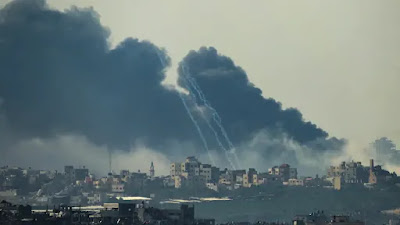 |
| Smoke rises above Gaza after Israeli airstrikes on Dec. 1. Photo: John MacDougall/AFP via Getty |
Fighting resumed in Gaza early Friday local time after Hamas and Israel failed to announce an agreement on extending the ceasefire before it expired.
The big picture: The renewed fighting comes after a seven-day pause during which Hamas more than 100 hostages, including two Americans, and Israel released 240 Palestinians from Israeli jails. Israel also allowed more aid trucks and fuel into Gaza to help address the dire humanitarian crisis.
- Sirens went off in southern Israel a little over an hour before the ceasefire was set to expire, with the Israeli military saying it intercepted one rocket fired from Gaza.
- Israel accused Hamas of violating the ceasefire by firing toward Israeli cities. The Israeli military said in a statement that it had resumed its operation against the militant group in Gaza in response.
- Israel renewed its air strikes on Gaza, including in some areas in the south, where hundreds of thousands of displaced Palestinians have been sheltering after fleeing their homes in the north.
State of play: Israel had previously vowed to continue the war "with full military power" after the pause ended.
- "We will fight in the entire Strip," Israeli Defense Minister Yoav Gallant said this week. Israel has said its goal in the war is to "destroy" Hamas and bring all the hostages who were abducted during the Oct. 7 terrorist attack home.
- The resumption of fighting is likely to deepen the humanitarian crisis in the enclave. While humanitarian groups welcomed the increased amount of aid allowed into Gaza during the pause, they warned it was only a fraction of what was needed.
What they're saying: The Biden administration said earlier this week that it made it clear to Israel that it expects the increased levels of humanitarian aid and fuel entering Gaza during the pause in fighting to continue even when the temporary ceasefire ended.
- President Biden also warned Israeli Prime Minister Benjamin Netanyahu this week that the way Israel operated in northern Gaza, which included a wide assault and three armored and infantry divisions, can't be repeated in the southern part of the enclave because of the millions of Palestinians who are there now.
Secretary of State Tony Blinken echoed Biden's comments during his meetings with Israeli officials on Thursday. Blinken also warned that the longer the high-intensity Israeli military campaign goes on, the more international pressure will build on both the U.S. and Israel to stop it, as Axios previously reported.
- The Biden administration is worried an Israeli operation in the south would lead to significantly more civilian casualties and deepen the already dire humanitarian crisis in Gaza, U.S. officials told Axios.
- At least 14,800 Palestinians, including 6,000 children, have been killed in Gaza since the war began, according to the Ministry of Health in Hamas-run Gaza.
What to watch: A White House National Security Council spokesperson said the U.S. continues to work with Israel, Egypt and Qatar "on efforts to extend the humanitarian pause in Gaza."
- "Hamas has so far failed to produce a list of hostages that would enable a further extension of the pause," the spokesperson added.
- "President Biden and his national security team will continue to remain deeply engaged as we look to free the remaining hostages and sustain and expand the international humanitarian response."

No comments:
Post a Comment
Arigtidaadu waa muhiim